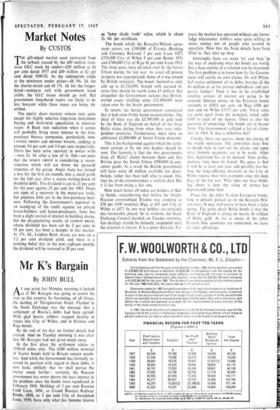Mr K's Bargain
By JOHN BULL
A -r one point last Monday morning it looked as if Mr Kosygin was going to crown his visit to this country by becoming, of all things, the darling of Throgmorton Street. Flashed to the Stock Exchange was the message that a settlement of Russia's debts had been agreed. With glad hearts, jobbers stopped dealing in stocks like City of Wilno, and in Estonia and Riga bonds.
By the end of the day, no further details had arrived. And on Tuesday morning it was clear that Mr Kosygin had not given much away.
In the first place the settlement relates to 1939-45 debts only. The £200 million nominal of Tsarist bonds held in Britain remain worth, less. And while the Government has formally re- served its position with regard to these debts, it now looks unlikely that we shall pursue the matter much further: certainly the Russian government has never shown the least interest in the problem since the bonds were repudiated in February 1918. Holdings of 3 per cent Russian Gold Loan, 1896, or Grand Russian Railway Bonds, 1858, or 5 per cent City of Astrakhan Loan, 1910, have only what has become known as lamp shade trade' value, which is about 2s. 6d. per certificate.
The bonds which the Kosygin/Wilson agree- ment covers are £588,000 of Estonia (Banking and Currency Reform) 7 per cent Loan 1927, £376,000 City of Wilno 5 per cent Bonds 1931 and £760,000 City of Riga 44 per cent Loan 1913. The three areas were all taken over by the Soviet Union during the last war. As usual all private property was expropriated. Some of it was owned by British nationals. The bonds themselves only add up to £1,724,000, though with accrued in- terest they should be worth some £3 million. But altogether the Government reckons that British- owned assets totalling some £12,400,000 were taken over by the Soviet government.
In return, the Soviet government considered that it had some firmly based counter-claims. The chief of these was the £5,700,000 in gold held by the Bank of England on behalf of the three Baltic states, dating from when they were inde- pendent countries. Furthermore, there were an additional £1,800,000 of Soviet Union demands.
This is the background against which the settle- ment arrived at by the two leaders should be seen. The formula is that the two governments drop all 'Baltic' claims between them and that Britain pays the Soviet Union £500,000 in con- sumer goods. As a result the British government will have some £6 million available for distri- bution, rather less than half what is owed. This may be, in the circumstances, a realistic deal. But it is far from being a fair one.
How much better off today are holders of Bal- tic bonds, remembering that before the Anglo- Russian communiqué Estonia was standing at £38 per £100 nominal, Riga at £42 and City of Wilno at £47? In one way holders are certainly less favourably placed. In its wisdom, the Stock Exchange Council decided, on Tuesday morning, that dealings should be formally suspended until the situation is clearer. It is a queer decision. For
years the market has operated without any know- ledge whatsoever. Jobbers were quite willing to make money out of people who wanted to speculate. Now that the basic details have been filled in, they shut up shop.
Admittedly there are many 'ifs' and 'buts' in the way of analysing what the bonds are worth.
But a bare outline of a solution can be discerned. The first problem is to know how far the Govern- ment will satisfy its own claims. Or will White- hall waive settlement of its debts, leaving all the £6 million or so for private individuals and cor- porate bodies? Then it has to be established whether arrears of interest are going to be counted. Interest owing on the Estonian bonds amounts to £1854 per cent, on Riga £106 per cent and on Wilno £1374 per cent. These sums are quite apart from the principal, which adds £100 to each of the figures. There is also the question of ownership. The bonds are in bearer form. The Government collated a list of claim- ants in 1964. Is that a definitive list?
Finally, there are queries about the timing of the whole operation. The authorities have first to decide how to sort out the claims and upon what formula payments are to be made. After that, legislation has to be devised. Then parlia- mentary time must be found. My guess is that it will be at least one year and possibly two be- fore the long-suffering investors in the City of Wilno receive their first payments since the dark days of the last war. What does not bear think- ing about is how the value of money has depreciated since then Prices for the other Eastern European bonds, long in default, picked up on the Kosygin/Wil- son news. It may well prove to have been a false spring. The point about Baltic bonds is that the Bank of England is sitting on nearly £6 million of Baltic gold. As far as many of the other Eastern bloc countries are concerned, we have no such advantage.





























 Previous page
Previous page